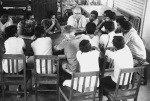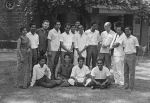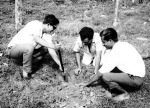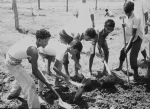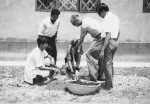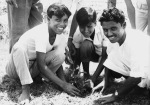Roger Gwynn
‘CONFESSIONS OF A COMPULSIVE WORKCAMPER’
Why?
Photos
Dhaka 1967
6 images
The international secretary of Service Civil International, Ralph Hegnauer, visited in 1967 Dhaka (Bangladesh / East Pakistan). A daytime workcamp was held in his honour at the Deaf and Dumb School, Dhaka - the project was tree planting and gardening.
Click on the photo
It's easy to edit one's past to make it more flattering: "As I had useful skills to share, I decided to devote a couple of years of my life to serving as a volunteer in the third world. My social conscience prompted me to do my bit in the battle against injustice and poverty. I was glad to be able to contribute something to the community where I was posted."
But I shall try to be honest. To explain satisfactorily how and why I became a volunteer I need to start at the beginning. I was born in 1941 in London. At that time bombs were falling, food was rationed, and our neighbourhood was full of refugees from the Nazi regime; yet my family was hardly affected by these circumstances, and my childhood was a remarkably sheltered one.
I attended a succession of private schools. Being teachable and obedient, rather than academic, I did well in class. In due course I secured a place at university.
But I was not ready for college, or, indeed, for life outside the cosy circle of home and school. I knew nothing whatever about society or politics, had no views about wealth and poverty, privilege and exploitation, was clueless about how other people lived. On top of that I had no ambition and no spirit of enterprise - I was so used to being told what to do, then doing it and receiving a pat on the head, that I could imagine no other way of carrying on.
So I was ill at ease amid the wild unfettered ferment of college life. But I did yearn to travel and see the world. As a student with limited resources, I looked around for cheap ways of exploring Europe in the vacations, and discovered two useful money-saving tools: hitchhiking and workcamping. Hitchhiking to move around, workcamping to stay in a place, see the area, meet people.
First workcamps
My first workcamp was in a village in the Taunus region of Germany. It was run by a small local organization called Aufbauwerk der Jugend - roughly speaking, ‘Young People for Reconstruction’. There were volunteers from Germany, France, Denmark, Sweden, Algeria and England. The work was unambitious - cleaning up the public areas in the village - but the camp was a great success; the volunteers bonded into a very happy team, and the village people made every effort to work with us and make us feel at home. The second World War had ended only fifteen years earlier, so reconciliation and the need for mutual understanding between nations were live issues; in this way the camp may have resembled some of the earliest SCI workcamps, which had been held, not far away, a mere 40 years before.
Subsequently I joined a forestry camp in Austria held by the Steiermarkischer Waldschutzverband (Styrian League for Forest Protection); a camp preparing relief goods in Sweden under the aegis of a tiny organization with big ideals called Agni (from the Sanskrit word for Fire); a camp in Spain run by the Delegacion Nacional de Juventudes (National Youth Organization), where the aim was to improve the civic
amenities in a coastal tourist town. Each of these camps had its own distinct character; all involved volunteers from at least three countries, but none recaptured the spirit of international brotherhood and reconciliation which had so impressed me in my very first workcamp.
Post-University and first contact with SCI
Somehow - only just - I survived my three years at university. I came away with a third class degree, and still no notion of what I was going to do with my life.
By now I had heard about ‘long term’ voluntary work. It sounded like a good idea - go abroad, enjoy the kind of workcamp situation I was already familiar with, see the world, put off the day of decision about careers. Thus it was that, shortly after leaving university, in the summer of 1963, I headed for St Girons in the French Pyrenees to join an SCI orientation programme which was being held there for prospective long term volunteers. The programme involved study sessions, with lectures by Jean-Pierre Petit, Etienne Reclus and others, plus short workcamps in Ariege villages.
Immediately after the orientation programme, I got an opportunity to see long term voluntary service at first hand. I hitch-hiked with another volunteer through Spain and Morocco to Tlemcen in Algeria. In a makeshift encampment on a rocky hillside I worked for a few days with French SCI volunteers who were carrying out a health and education programme with Algerian war refugees. A derelict hut, used by goats as a shelter, was to be restored and converted into a bedroom. My job was to clean it out, plaster the rough walls and make a new wooden door. The highlight of this brief placement was being invited by one of the refugees to share a meal of couscous in her tiny shack.
Back in England I discovered IVS (the UK branch of SCI) and its network of local groups. I joined the London group and became a ‘regular’ at its weekend workcamp programme - which mostly involved painting and decorating in the homes of disadvantaged people in run-down areas of the city: the aged, the disabled, the mentally ill. The participants in these camps were mainly middle-class and English; but on some occasions we were joined by inmates of Wormwood Scrubs prison, who were allowed out on day release for the purpose. For me it was a revelation to see the dismal and often sordid conditions in which less fortunate Londoners lived.
On one occasion we were sent out with collecting tins, to raise money for SCI's emergency work in Algeria. This was my first experience of going from house to house or flat to flat, knocking on the doors of strangers, trying to explain SCI's aims and activities in a few words, then asking tactfully for a donation. A small minority of the people we approached took a real interest in what we were saying about refugees, poverty and voluntary service. I remember in particular the enthusiastic reactions of some Indian students, and the moving response from a Jordanian doctor who was so pleased to hear we were collecting for relief work in an Arab country that he ushered my two companions and me into his tiny flat and entertained us with sweet cardamom-flavoured coffee.
Becoming an SCI LTV (Long Term Volunteer) for East Pakistan
But I still had to decide what to do with myself. Wisely or not, my parents put no pressure on me to take up a career. "Go into teaching," said an aunt. She knew I had been an exemplary schoolboy, and sensed that I wasn't cut out for commerce or industry ... or law or accountancy ... or indeed anything much else. Someone came up with a suggestion which intrigued me - go to Makerere College in Uganda, where you can train to be a teacher at the same time as helping Ugandan children and seeing East Africa. After much deliberation I applied through the appropriate channel, the UK Department of Technical Cooperation (forerunner of the Overseas Development Agency).
However, I also applied to IVS for a place as a long term volunteer. The fact that I had no skills to offer hardly entered my head; yet it must certainly have crossed the minds of the people who interviewed me. "He seems harmless enough, but what use could he possibly be?" was what they asked themselves.
Indeed, it took the best part of a year for a suitable unskilled vacancy to materialise. At different stages IVS sought placements for me in South America (with the United Nations Association); Thailand; Africa; and India. Each of these plans fell through. Meanwhile I worked for some months as a bricklayer's mate, then travelled in France, Switzerland and Yugoslavia. I was accepted as a postgraduate student at Makerere College, but by then I was so set on becoming an LTV that I turned down the offer. At last it was decided - I was to go to Pakistan to help liaise between the separate SCI groups in West and East Pakistan and encourage their development.
In those days IVS volunteers were still being sent to Asia by boat. There were six of us in a little batch of new LTVs setting off from Victoria Station, London, on 5th October 1964. The other five were girls. Nina Atkins, a nurse, and Anne Harland, a teacher, were to work with Tibetan refugees in Kasauli in northern India; Margaret Sargeant, a social anthropologist, would be posted in Kanya Kumari in Madras State, south India; occupational therapists Judy Wallis and Jackie Horner were heading for Chieng Mai in northern Thailand. We travelled by train to Marseilles and boarded the SS Vietnam, a cargo cum passenger ship operated by the French company Messageries Maritimes. It took us almost a week to reach Bombay via the Suez Canal, another day to get from Bombay to Delhi by train. Before scattering to our various destinations we attended our first Asian workcamp in a village in Haryana - a congenial introduction to rural India.
I then visited West Pakistan to meet the SCI groups in Lahore and Multan; returned to Delhi and went by train to Calcutta, then on to Dhaka in East Pakistan. From that moment, although I didn't realise it at the time, my fate was sealed, the course of my life determined.
I worked with the SCI East Pakistan Group for a year, living all the time with local volunteers and visiting various parts of the country. I was in very good hands - thanks to the friendliness, generosity and optimism of my hosts I felt completely at home, and quickly fell in love with the country and its culture. My original brief, of liaison between the West and East Pakistan SCI groups, was somehow forgotten when the volunteers of East Pakistan Group, with the most warm-hearted enthusiasm, adopted me as their own.
I got involved in numerous kinds of activity. It started with an international workcamp on Sandwip, a beautiful cyclone-ravaged island, where a new primary school building was being erected. Then, back in Dhaka, there were weekend working parties attended by local students, doing such things as cleaning ponds and levelling playgrounds. I spent a lot of time in the SCI office (a cramped space in an outbuilding), communicating with prospective volunteers and producing a monthly newsletter with the aid of a borrowed portable typewriter and a messy Gestetner duplicating machine.
After a while I was sent away to a northern district called Rajshahi, where I was to join in the activities of the local SCI group and encourage its development. To fill in time between work programmes I stayed at a nearby Catholic mission and taught English at the mission school.
Then another cyclone hit the southern part of the country; I was recalled to Dhaka, and joined a team of SCI volunteers who were put at the disposal of the East Pakistan Red Cross and helped distribute relief goods in Barisal district. After that I was allowed to accompany an official SCI survey team which toured the cyclone affected area of Patuakhali to identify a suitable location for a long term development project. The island of Moudubi was eventually selected as the site. Then I was back in Rajshahi for a while; returned to Dhaka to resume production of the SCI newsletter; took part in further non-residential work programmes in the city, including a construction project at an orphanage.
Meanwhile there was trouble in Kashmir, and diplomatic relations between Pakistan and India were reaching a nadir. There was a brief war between the two states, and although East Pakistan was scarcely affected by the hostilities, endless discussions went on among SCI members about the political and military implications of the conflict.
There was some talk of SCI holding an international workcamp to bring together volunteers from India and Pakistan; however the tense political situation and closure of borders made this impracticable. Instead a residential work and study camp was held in the grounds of a mission school in Dhaka, which was centred on tree-planting.
Subsequent returns to Bangladesh and its impact
And then my time was up. But even before I left for England, after one year with SCI East Pakistan, I had made plans for my return. My second period of voluntary service lasted about eighteen months; I was photographer and administrative assistant for an international child sponsorship scheme run by Aid for Destitute Children. Then I went back to England, trained as a teacher, and started work in a primary school in Birmingham. Simultaneously I developed links with the local Bengalispeaking community. Then, in 1971, civil war broke out in Pakistan, and its East wing became the independent state of Bangladesh. That prompted me to do a third stint of voluntary service there. IVS was willing to sponsor me, and I was attached to SCI Bangladesh so that I could participate in its ongoing SCI workcamp programme (mainly concerned with post-war rehabilitation), but for some of the time I was loaned to the Ganashasthya Kendra, a pioneering rural health project. I stayed for a total of three years.
But the story doesn't even end there, as I have continued to make return visits to Bangladesh and to remain deeply involved, as a volunteer, in the Bangladeshi community in Britain.
Final thoughts
What does it all prove? Well, I suppose it shows that even a cosseted dilettante who drifts into voluntary service with mixed and dubious motives is not beyond redemption. By any objective measurement I was a pretty useless LTV; yet I think some positive good resulted from the periods of unfocussed messing-about in far-off lands which I was lucky enough to get away with. Certainly it changed me; gradually, over the years, my SCI experiences forced me to think more seriously about major international and communal issues - economic disparity, exploitation, racism - and my own role in it all. I found some purpose in life. These were huge gains for me; though of course, whether or not anybody else benefited is open to doubt.
As far as I'm concerned, my time with SCI brought three specific benefits. Firstly, the habits of patience and frugality which workcamping inculcated in me have taught me to enjoy life more fully, and probably also helped me to be a more responsible citizen of this crowded world than I would otherwise have been. Second, the knowledge and experience which I gathered, quite capriciously, during my years abroad eventually became useful tools in my work. But third and most important, I gained lifelong friends. It is for blessing me with these special, long-lasting friendships that I'm most grateful to SCI.




